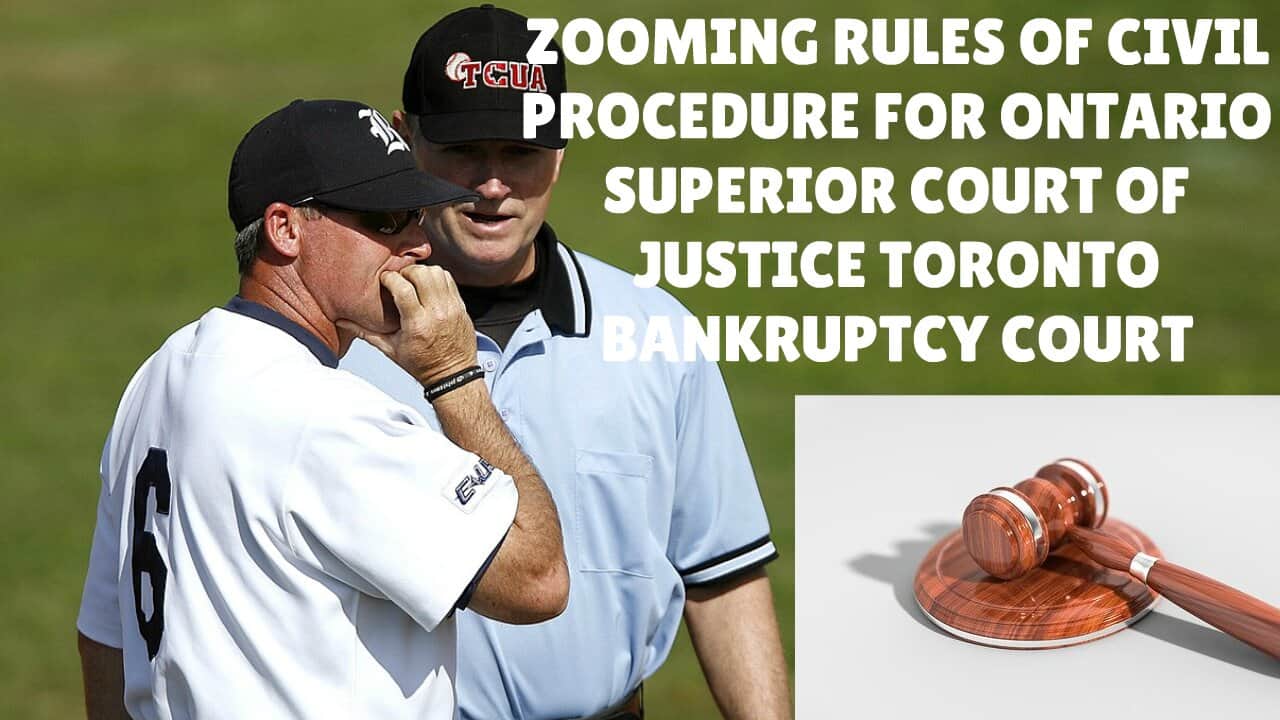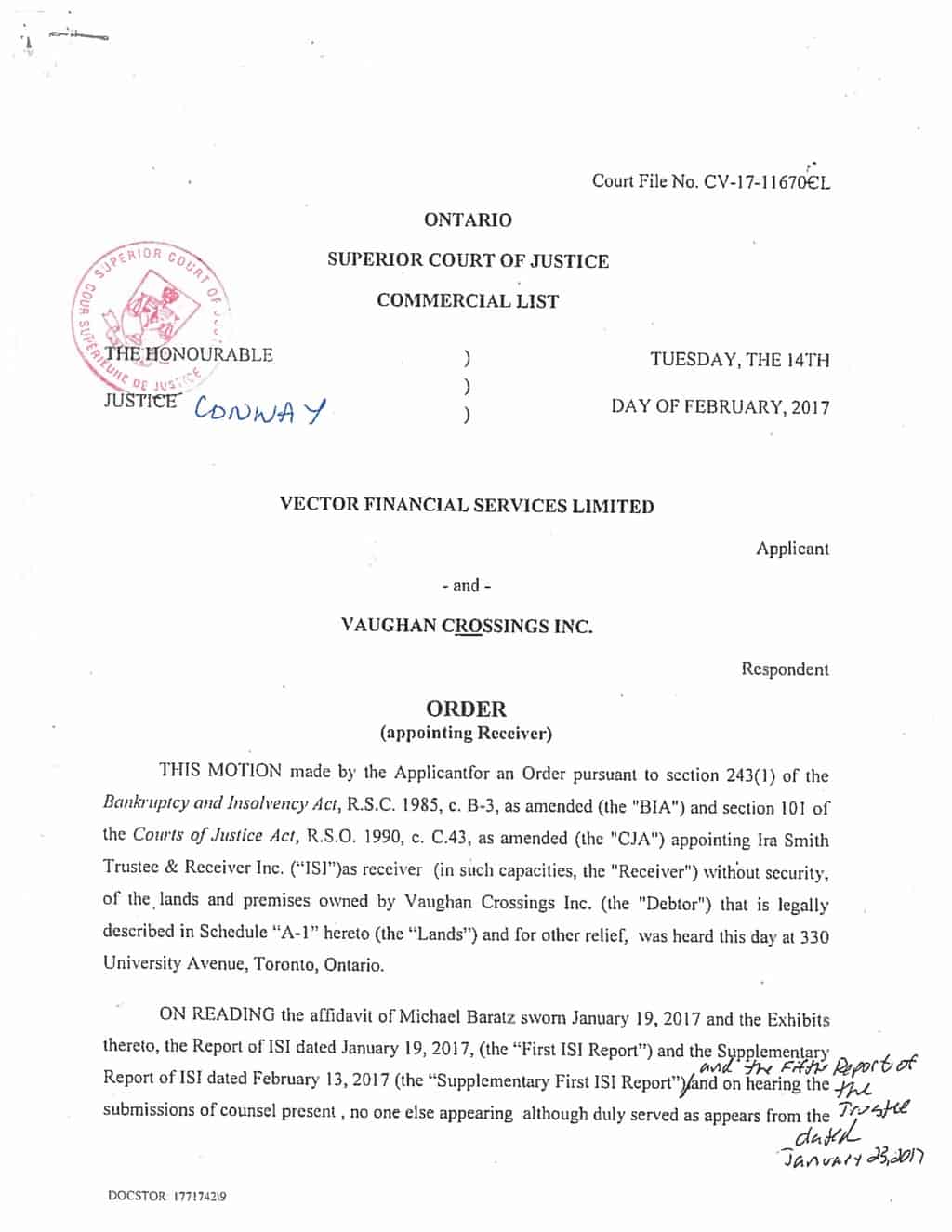 The Ira Smith Trustee Team is absolutely operational and Ira, in addition to Brandon Smith, is readily available for a telephone consultation or video meeting.
The Ira Smith Trustee Team is absolutely operational and Ira, in addition to Brandon Smith, is readily available for a telephone consultation or video meeting.
If you would prefer to listen to an audio version of this Brandon’s Blog, please scroll to the bottom and click on the podcast.
Rules of civil procedure introduction
Today’s blog is taking a lighter look at new rules of civil procedure for a Zooming video conference world. These are my somewhat tongue in cheek suggestions for the Superior Court of Justice Toronto bankruptcy court.
I did not make these up. I am taking it from an actual Standing Order For The Conduct of Evidentiary Video Conference Hearings. It was issued by the Honourable D. H. Lester, Circuit Judge in the Circuit Court of the Fourth Judicial Circuit, Clay County Florida. It was sent to me by a Florida bankruptcy attorney friend of mine. I have just amended them for the Ontario Superior Court of Justice Toronto bankruptcy court context.
I have not seen any such pronouncements from the Ontario Superior Court of Justice Toronto Bankruptcy Court (and doubt that I will!). Below would be my proposed amendments to the R.R.O. 1990, Reg. 194: RULES OF CIVIL PROCEDURE (Rules of Civil Procedure) under the Courts of Justice Act, R.S.O. 1990, c. C.43. Everything I am suggesting below was actually in the Florida Standing Order.
New rules of civil procedure 46.02
Rules of civil procedure 46 through 51, sets out the rules of civil procedure for pre-trial procedures. I propose a new rule, number 46.02, to read:
46.02 Prior to any video conference hearing, all counsel, parties and witnesses shall familiarize themselves with the operation of Zoom and its capabilities. Instructions on Zoom operation may be found at https://zoom.us/resources. The following procedure will be followed:
(a) Enter your name on your Zoom profile so that you can be identified by the Judge.
(b) Devices must be fully charged prior to the hearing with a charger accessible in the event it becomes necessary.
(c) Devices must remain muted unless the participant is speaking. All participants must be in a location that is free of extraneous noise or visual distraction.
(d) A virtual background is not permitted.
(e) Hearings are court proceedings. Appropriate courtroom attire for counsel, parties and witnesses is expected.
It is too bad that virtual backgrounds would not be allowed in the Toronto bankruptcy court. I personally would want to attend a bankruptcy court hearing with this background:

As far as appropriate courtroom attire, I asked my friend if a judge has made him stand up yet to see what he was wearing below the waist. He said he has not yet been asked to do so, but it could happen.
New Superior Court of Justice rules of civil procedure for witness testimony
Rule 53 of the Rules of Civil Procedure deals with evidence at trial. I propose a new rule 53.01.1 which would go something like:
53.01.1 (a) At least three business days prior to hearing, the parties shall e-mail to the court a list of all witnesses expected to be called, with full names, e-mail addresses and cell phone numbers. Real names must be used. Court reporters are meeting participants. If a court reporter will be present, the reporter’s name and e-mail address shall be provided along with the witness list.
(b) After any opening statements, when a witness is called, the judge will admit the witness from the waiting room. After testifying, the witness will be removed electronically from the hearing.
(c) Witnesses must be alone. Prior to testifying and after testifying, witnesses shall scan the room to confirm they are the only person in the room. However, if an interpreter is necessary, interpreters may be either in the room with a witness or a meeting participant. The parties list of witnesses should indicate whether a witness will be testifying through an interpreter. The interpreter’s name and e-mail address must be provided to the judge in the list of witnesses.
(d) Passing of electronic notes during testimony and recording of the proceedings is forbidden.
(e) All other electronic devices must be turned off.
(f) A lawyer and a party may be in the same room. However, the camera must capture both. No one else may be present in the room.
New rules of civil procedure for documents in writing in Superior Court of Justice proceedings
I propose new rules of civil procedure number 4.01.1:
4.01.1 (a) At least five days prior to hearing, the lawyers shall confer
to disclose exhibits and other documents in writing expected to be used and to stipulate to as many as possible.
(b) All documents in writing must be delivered, e-mailed to the judge or e-filed at least three business days prior to the hearing. They should be pre-marked, identifying the party and exhibit number. Exhibits over ten pages in the number of pages shall be either delivered to the judge or e-filed in searchable PDF format with computer-generated page numbers. The parties must also provide an index that includes the number of pages.
(c) All lawyers, the judge and the court reporter must have a copy of all documents in writing. Witnesses must have a copy of all documents in writing to which they will testify or for which they will lay the predicate for admission.
(d) Documents in writing can be shared during the video hearing using a shared screen on Zoom.
Rules of civil procedure for the Superior Court of Justice
So this is what was in the Florida Standing Order for a Zooming video environment. I hope you enjoyed this somewhat light-hearted Brandon’s Blog.
The Ira Smith Team family hopes that you and your family members are remaining secure, healthy and well-balanced. Our hearts go out to every person that has been affected either via misfortune or inconvenience.
We all must help each other to stop the spread of the coronavirus. Social distancing and self-quarantining are sacrifices that are not optional. Families are literally separated from each other. We look forward to the time when life can return to something near to typical and we can all be together once again.
Ira Smith Trustee & Receiver Inc. has constantly used clean, safe and secure ways in our professional firm and we continue to do so.
Income, revenue and cash flow shortages are critical issues facing entrepreneurs, their companies and individual Canadians. This is especially true these days.
If anyone needs our assistance for debt relief Canada COVID-19, or you just need some answers for questions that are bothering you, feel confident that Ira or Brandon can still assist you. Telephone consultations and/or virtual conferences are readily available for anyone feeling the need to discuss their personal or company situation.
The Ira Smith Trustee Team is absolutely operational and Ira, in addition to Brandon Smith, is readily available for a telephone consultation or video meeting.




